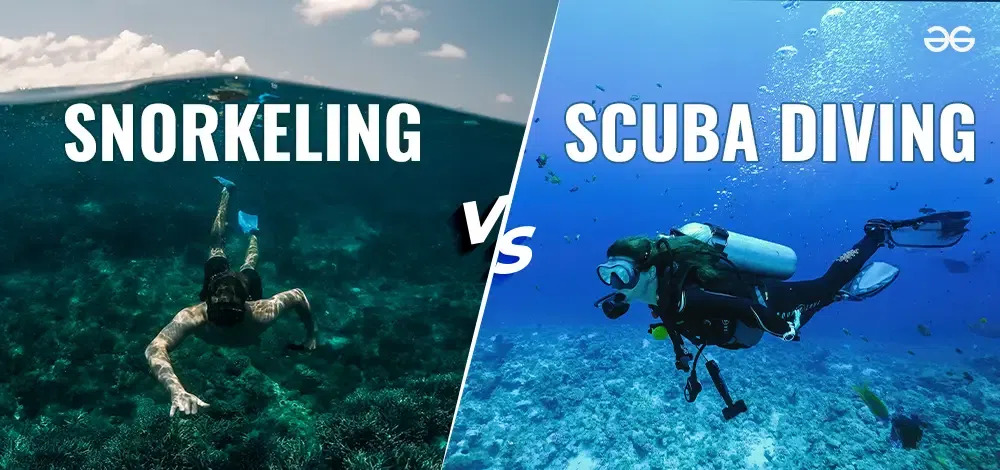Snorkelling and scuba diving are the most popular ways to explore the underwater world. They allow you to witness the incredible marine biodiversity of the Gold Coast, from colourful coral reefs to majestic whales.
Whether you’re drawn to the serene beauty of the ocean's surface or the thrill of exploring the deep, the choice between scuba and snorkel at Gold Coast can be a tough one. Both activities offer unique experiences and cater to different preferences and skill levels.
This article compares snorkelling and scuba diving to help you decide which adventure is best for you.
a. Snorkelling
Snorkelling is a fantastic way to explore the underwater world with minimal equipment and training. It involves swimming on the water's surface while wearing a mask, snorkel, and fins. Here are some key aspects of snorkelling:
1. Accessibility and Ease
The main advantage of snorkelling at Gold Coast is its accessibility. It requires no formal training, and you can start exploring the ocean after a brief introduction to the equipment. The Gold Coast offers numerous spots ideal for snorkelling, including popular destinations like the Gold Coast Snorkelling Trail and Cook Island. You can easily find guided tours that provide all the necessary gear and instruction for a safe and enjoyable experience.
2. Equipment
Snorkelling gear is simple and easy to use. A snorkel allows you to breathe while keeping your face submerged, a mask provides clear vision, and fins help you move efficiently through the water. This minimal setup makes snorkelling a hassle-free activity you can enjoy with minimal preparation.
3. Marine Life and Experience
Snorkelling is perfect for observing marine life close to the surface. On the Gold Coast, you can encounter a variety of fish, sea turtles, and vibrant coral formations. The most exciting experience is snorkelling with whales during their migration season. This unforgettable encounter allows you to witness these gentle giants up close in their natural habitat.
4. Safety
Snorkelling is considered safe in calm and shallow waters. However, to ensure a safe experience, be mindful of currents, weather conditions, and marine life.
b. Scuba Diving
Scuba diving takes you deeper into the ocean, offering an immersive experience that allows you to explore underwater environments that are out of reach for snorkelers.
1. Training and Certification
Unlike snorkelling, scuba diving requires formal training and certification. To dive safely, you need to complete a scuba diving course. The Gold Coast offers a range of courses for beginners and advanced divers, where you can learn essential skills and safety procedures. These courses ensure that you are well-prepared to handle the challenges of diving and can fully enjoy the experience.
2. Equipment
Scuba diving requires more complex equipment, including a tank of compressed air, a regulator for breathing, a buoyancy control device (BCD), and a wetsuit. This gear allows you to dive deeper and stay underwater for extended periods, providing an immersive experience.
3. Marine Life and Experience
Gold Coast scuba diving offers an unparalleled opportunity to explore the ocean depths. Dive sites like the Scottish Prince Wreck and the Palm Beach Reef teem with marine life, including rays, sharks, and an array of colourful fish. The sensation of weightlessness and the ability to move freely in three dimensions make scuba diving a unique and exhilarating adventure.
4. Safety
While scuba diving is safe when proper procedures are followed, it does carry more risks than snorkelling. It's crucial to dive within your certification limits, maintain good communication with your dive buddy, and monitor your air supply and depth. Diving with experienced professionals and adhering to safety guidelines ensures a safe and enjoyable experience.
- Comparing Snorkeling and Scuba Diving
To help you decide between snorkelling and scuba diving, let's compare the two activities based on several factors:
(i) Accessibility
? Snorkelling: Requires minimal training and equipment, making it accessible to almost everyone.
? Scuba Diving: Requires certification and more specialised equipment, which involves a greater commitment in terms of time and money.
(ii) Depth and Duration
? Snorkelling: Limited to the surface and shallow depths, up to 10 feet. Sessions can last as long as you’re comfortable in the water.
? Scuba Diving: Allows you to explore deeper waters, between 30 and 130 feet, depending on your certification level. Dive times are limited by your air supply, ranging from 30 to 60 minutes.
(iii) Experience and Marine Life
? Snorkelling: Best for observing surface-dwelling marine life and coral reefs.
? Scuba Diving: Offers a more immersive experience, allowing you to explore shipwrecks, and deep reefs, and encounter a wider variety of marine life.
(iv) Safety
? Snorkelling: Risks are minimal if you stay in calm, shallow waters.
? Scuba Diving: Requires adherence to safety protocols and awareness of potential hazards like decompression sickness. Proper training and guided dives mitigate these risks.
- Conclusion
The choice between snorkelling and scuba diving depends on your preferences, experience level, and the type of marine adventure you’re seeking. Both snorkelling and scuba diving offer unique and rewarding ways to explore the underwater world of the Gold Coast.
If you’re looking for a simple, accessible activity that requires minimal training, snorkelling is an excellent choice. You’ll enjoy the beauty of the ocean’s surface and have the chance to snorkel with whales for an unforgettable experience.
If you’re seeking a more immersive adventure and are willing to invest in training and equipment, scuba diving is the way to go. Taking a scuba diving course on the Gold Coast will equip you with the skills and confidence to dive safely and enjoy the underwater world.
Regardless of the choice, Gold Coast’s dive sites provide thrilling opportunities to explore deeper marine environments and encounter a diverse array of sea life.

 Daniel
Daniel



